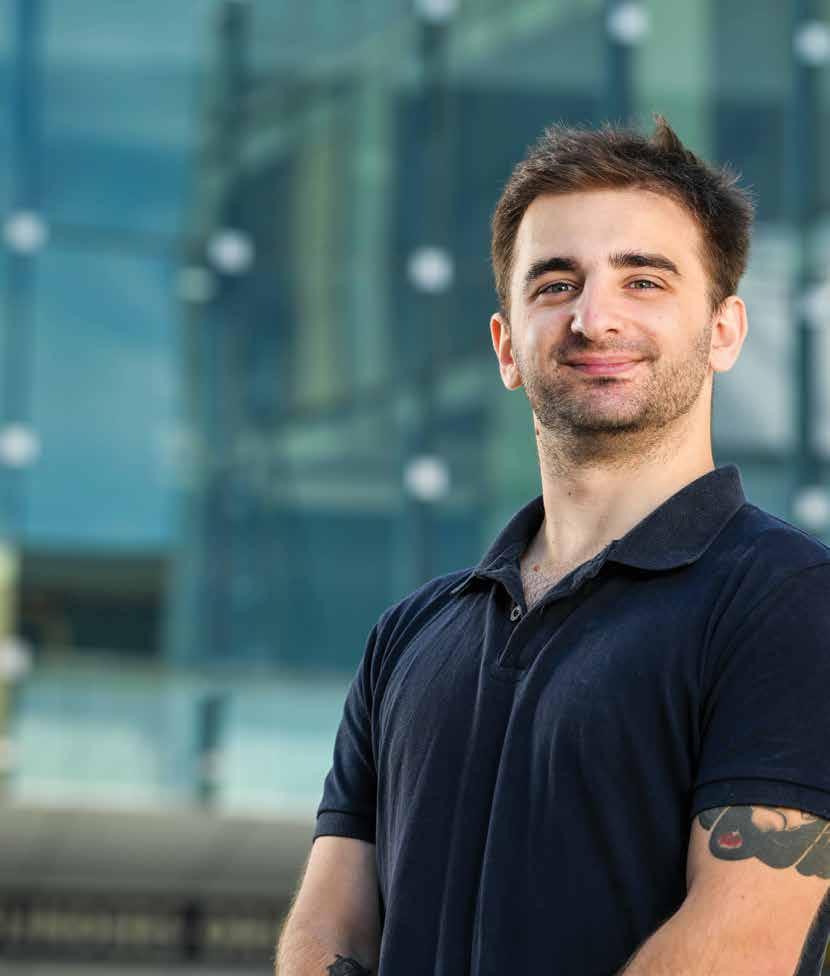
Visionary support
improve Indigenous health, page 6.
Biodiverse green spaces for better health, page 8.
Achieving a dream and overcoming generational poverty, page 17.
to
“To the donors of the Matthew Flinders Scholarship, I really appreciate your selflessness in supporting students to continue their education.” Angelique Dellaney
During her Bachelor of Health Science, Angelique faced medical issues and found it hard to commute to campus from her home in Victor Harbor.
Studying online made it possible for her to continue her degree from home – but her old computer wasn’t up to the task.
“I desperately needed a new laptop but didn’t have the funds,” says Angelique.
“Because of the Matthew Flinders Scholarship, I was able to purchase a new laptop and continue my studies – it was a big relief.”
Angelique’s dream is to become an occupational therapist and, based on her Health Science degree results, she has transferred into a Bachelor of Allied Health (Occupational Therapy).
Also working as a disability support worker, Angelique is keen to develop the skills and attain life experiences that will benefit her future career as an occupational therapist.
Thank you for supporting students in financial need through the Matthew Flinders Scholarship.
Flinders.edu.au/support
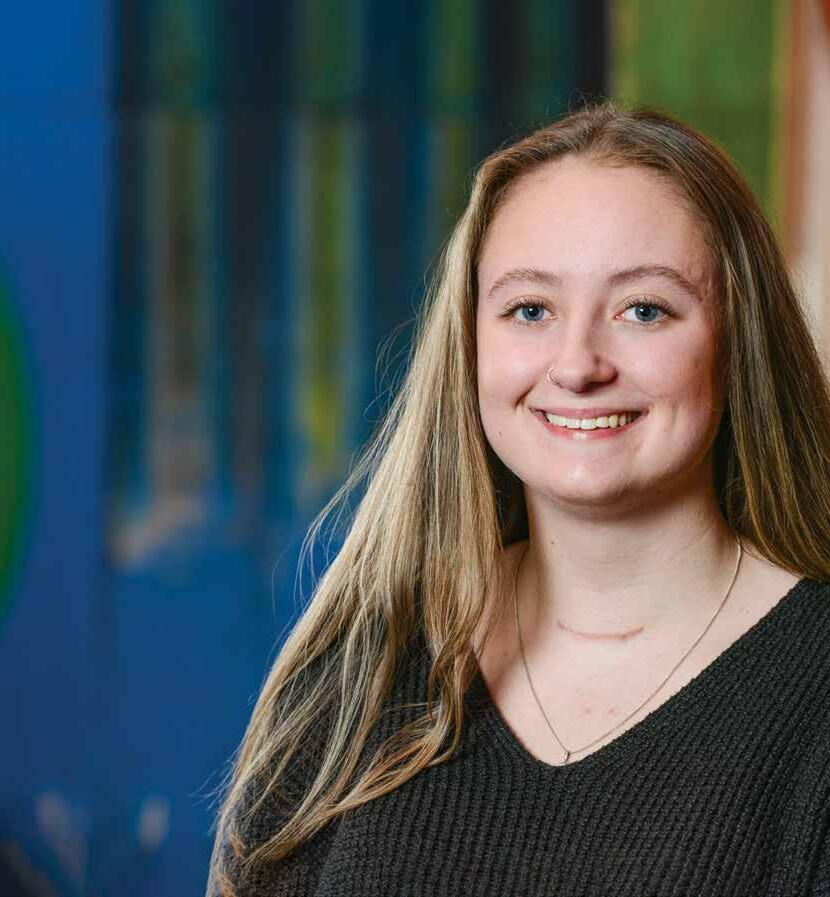
Acknowledgement of Country
Flinders University acknowledges the Traditional Owners and Custodians of the lands on which its campuses are located. These are the Traditional Lands of the Arrernte, Dagoman, First Nations of the South East, First Peoples of the River Murray and Mallee region, Jawoyn, Kaurna, Larrakia, Ngadjuri, Ngarrindjeri, Ramindjeri, Warumungu, Wardaman and Yolngu people. We honour their Elders past, present and emerging.
Giving for a better future
Donor support for education and research at Flinders University will create a better future.
One of my most deeply held values is that of making a difference. It is something I always sought to do throughout my academic career, whether as an educator in the classroom or as a researcher at the laboratory bench.
Now as Vice-Chancellor of this remarkable institution, I strive to continue to make a difference by creating an environment in which educators, learners and researchers can flourish, and where staff and students alike can succeed to the very best of their abilities.
Sometimes the barriers to success are purely financial and so I am proud to also be a donor to important support programs such as the Matthew Flinders Scholarships and Impact Seed Funding for Early Career Researchers.
All of our donors share a desire to make a difference, and I want to express my gratitude for your generosity and the impact it is having here at Flinders.
For example, through donor support for the Impact Seed Funding for Early Career Researchers program, Associate Professor Martin Breed’s discoveries on biodiversity in green spaces will improve our health and wellbeing.
Donor generosity is also making a profound difference to our students as they strive for a better future through education. The Matthew Flinders Scholarship continues to be a lifeline for students in financial need, as do the many life-changing, donor-funded named scholarships.
Flinders University is a strong and vibrant institution that is making a growing contribution to our society through both the quality of our research and the quality of our graduates. The scale of these contributions is expanded through your generosity.
With ongoing donor support, the dedication of our students, and the pioneering spirit of our researchers, Flinders University continues to change lives and change the world.
Thank you for joining us on our mission and giving for a better future.

Professor
Colin J Stirling President and Vice-Chancellor
Editor:
Writers: Lynda Allen & David
Design: Kimberley Baker,
Photography: Brenton Edwards
Photos supplied: pages 12, 16,
35.2% Matthew Flinders Scholarship 15.7% Medical Research 8.2% Environmental Research 7.5% Early Career Research
5.6% Aboriginal & Torres Strait Islander Scholarships
Other Scholarships
Highest Priority Research & Education Projects
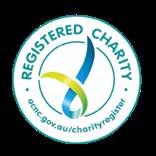
What you supported in 2023
5.2%
5% Arts
4.1% Medical
2.8% Library 2.5% Rural & Remote Scholarships 1.5% Archaeology Education & Research 1.4% Other 100 % of your donation supports the cause you identify contact us Advancement
University +61 8 8201 3721
Flinders.edu.au/giving
2024 Impact of Giving report is published by Advancement, Flinders University.
5.3%
Education & Research
Education
Flinders
giving@flinders.edu.au
The
Lynda Allen
Sly
Visual Communication
Flux
Printed in South Australia by Flinders Press using soy-based inks on environmentally responsible paper. © 2024 Flinders University CRICOS 00114A
18
Improving the lives of children with dementia
LITTLE HEROES FOUNDATION
Crucial new treatment options for childhood dementia are being explored by Flinders University researchers, thanks to critical funding from Little Heroes Foundation.
Each year an estimated 50,000 babies are born with a genetic condition that causes childhood dementia. Fifty percent of these children die by the age of ten, and 75 percent by the age of 18.
With the condition progressing rapidly and becoming fatal, early intervention for children with dementia is crucial – yet very few treatment options are available to improve the quality of their short lives.
Now with the support of $70,000 from Little Heroes Foundation, Dr Siti Mubarokah, in the Childhood Dementia Research Group at Flinders University, has made an early discovery on a drug that changes some childhood dementia impacted cells, to make them more like normal cells.
“I hope the results of this project will lead to a safe, widely available drug treatment for childhood dementia caused by Sanfilippo syndrome, along with further breakthroughs for other types of childhood dementia,” says Dr Mubarokah.
“As a genetic disorder, currently childhood dementia can’t be cured, but if we are able to provide early intervention through drug treatments, the impacts of dementia can be slowed and children will enjoy a better quality of life.” Dr Siti Mubarokah
In a world-first that helped her reach this discovery, Dr Mubarokah has created a new cell model, using direct
chemical reprogramming, to turn a Sanfilippo patient’s skin cells into nervous system cells.
This cell model is then used to test and identify a range of potential drug treatment options for those with the disease.
“This new cell model, to our knowledge, has not been utilised by any other researchers in the childhood dementia field,” says Dr Mubarokah.
“The chemical reprogramming of the cells only takes around two weeks for each patient, making it an excellent model for swiftly identifying new treatments for Sanfilippo syndrome, which could otherwise take years – a timeframe that sufferers simply don’t have.
“I am very excited by this finding, especially as the drug family used in the successful trial is already being utilised for a different disease, so its safety profile is well known and understood,” she says.
“It’s good news as repurposing approved drugs could fast track treatments for Sanfilippo patients across the world – and it’s the cheapest and most accessible option,” says Dr Mubarokah.
This study forms part of an extensive program in childhood dementia research at Flinders University. Led by Professor Kim Hemsley, the research group interacts closely with patients and families.
“Our research is driven by a commitment to improve the lives of children affected by dementia, and their families,” says Professor Hemsley.
“The generous support from the Little Heroes Foundation has provided the whole team with great motivation and purpose, and we expect the findings may also be applied to other forms of childhood dementia.”
SUPPORTING RESEARCH 4 FLINDERS UNIVERSITY / Impact of Giving 2024
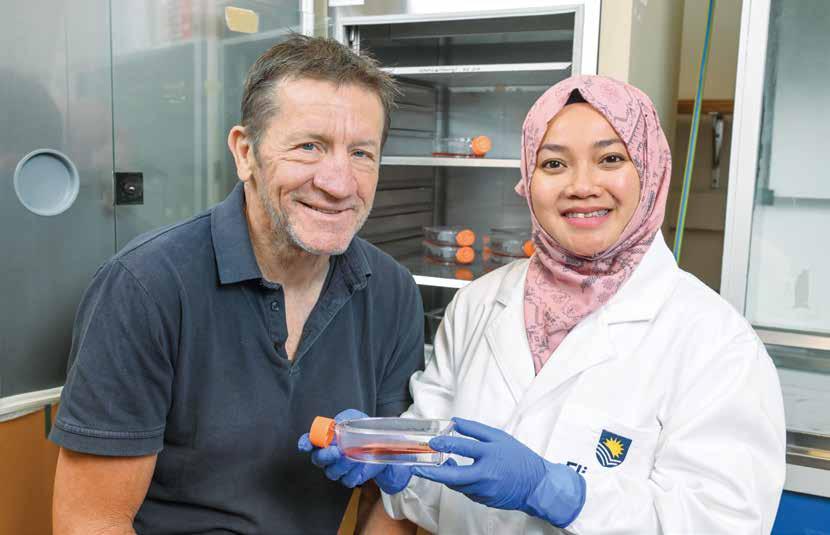
Chris McDermott, Chair of Little Heroes Foundation, says support for Dr Mubarokah’s research is an important part of the Foundation’s ongoing commitment to address childhood dementia, which currently affects an estimated 700,000 children.
“Childhood dementia is a devastating condition that causes children
to progressively lose the ability to write, read, talk, walk and play – before dying prematurely.”
Chris McDermott
“Little Heroes Foundation is pleased to partner with Flinders University to support the innovative work of Dr Siti Mubarokah, as we work towards our goal of improving the lives of the children with this destructive disease.”
Dr Mubarokah is especially grateful for the support.
“The funding from Little Heroes has been vital to my research, and means finding a treatment for childhood dementia has become more achievable,” says Dr Mubarokah.
“The support has also provided me with a sense of fulfilment, responsibility and purpose, knowing that the research has the potential to improve the lives of affected children and their families.”
But she says more funding is needed to progress the recent discovery to a clinical trial of the drug with patients who have Sanfilippo syndrome.
“We need more funding to continue this work to the next stage so that we can get the drug treatments approved and help those currently suffering.”
Dr Siti Mubarokah
“The clock is ticking for children with childhood dementia, and prompt action is urgently required.”
Chris McDermott and Dr Siti Mubarokah
With your help our researchers can develop treatments that improve the lives of children with dementia. Contact Bonnie Allmond 08 7421 9995 bonnie.allmond@flinders.edu.au 5

Visionary support to improve Indigenous health
SUPPORTING INDIGENOUS EDUCATION
CALTHORPE WONG INDIGENOUS MEDICAL SCHOLARSHIP
Visionary philanthropists Drs Mary Calthorpe and George Wong have set out to change the landscape of medical care in Aboriginal and Torres Strait Islander communities.
According to a report by the Federal Government’s Australian Institute of Health and Welfare, barriers to accessing health services for Indigenous Australians include services not being available in their area (especially remote areas), access to transport, cost, waiting times, and the availability of culturally safe and responsive health services.
It’s a situation that is having dire health impacts on individuals and their communities – something that Drs Calthorpe and Wong witnessed first-hand when they worked as ophthalmologists and treated Indigenous patients.
To address the barriers, in 2021 the now retired couple made a generous one million dollar donation to establish the Calthorpe Wong Indigenous Medical Scholarship at Flinders University.
It’s visionary support that will not only change an Aboriginal or Torres Strait Islander medical student’s life each year, but change the lives of many in Indigenous communities by increasing their access to essential medical care.
Dr Calthorpe says, “During our professional careers we sought to understand the health challenges facing Aboriginal and Torres Strait Islander people. As a result, we have created this scholarship in perpetuity to support the studies of Indigenous medical students.”
“It is our hope that Indigenous people will be able
to access medical care in their own region, from people they identify with, who speak their language, and thoroughly understand their cultural background.” Dr Mary Calthorpe
“We place our trust and have confidence in these doctors to significantly improve Indigenous health outcomes.”
So far, two Indigenous students at Flinders have received $20,000 for each year of their medical degree, helping them to meet the financial challenges they face throughout their studies.
With two small children, second year medical student Lauren Navarrete says juggling the workload of the demanding degree with family needs has been incredibly difficult, causing her to worry about whether she could continue.
“This scholarship funding is the reason studying medicine is possible is for me.”
Lauren Navarrete
“Thanks to this support I can focus on my studies and the challenging new territory of science.”
Lauren grew up in the coastal town of Kempsey, New South Wales, with her mother’s Dunghutti mob.
She initially studied a Bachelor of Midwifery where she came to understand the unique challenges faced by Indigenous women and their families.
“I worked with an Indigenous midwifery group practice,” says Lauren. “It really cemented why I wanted to get into health care in the first place, and it inspired me to follow my dream of making a difference as a doctor.”
With the annual support of the Calthorpe Wong Indigenous Medical Scholarship, Lauren’s financial pressures have been reduced for the rest of her four-year medical degree, including day to day living costs, study resources and necessary equipment such as a stethoscope.
“This is an incredibly generous scholarship and I really cannot put into words how grateful I am to be the recipient.” Lauren Navarrete
To the scholarship’s donors she says, “Thank you from the bottom of my heart for this support that allows me to be here at university, and on my way to achieving my goal of becoming a doctor.”
Knowing how much difference it can make, Lauren says she is looking forward to giving back not only financially but also by working as a rural GP.
“My main interest is women’s health, particularly the perinatal period,” says Lauren.
“I can see myself working as a rural GP, as I would like to give back and provide health care in Aboriginal communities as an Aboriginal doctor.”
Pictured: Lauren Navarrete
Change the life of a student and create impact in the community – establish a named scholarship at Flinders University. Contact Mark Goldsmith 0421 818 130 mark.goldsmith@flinders.edu.au 7
Biodiverse green spaces for better health
IMPACT SEED FUNDING FOR EARLY CAREER RESEARCHERS
Ecologist Associate Professor Martin Breed has discovered powerful insights into the importance of urban green spaces on our health and wellbeing.
Associate Professor Breed is a member of the World Health Organisation (WHO) Biodiversity, Climate, One Health and Nature-Based Solutions Expert Working Group. His research at Flinders University is supporting both the WHO and the United Nations to develop an evidence-based narrative that unites the health and environment sectors in a shared purpose.
Contributing to this goal, Associate Professor Breed developed a study on the impact of urban green spaces on our health, thanks to the support of a donor-funded Impact Seed Funding for Early Career Researchers grant.
Associate Professor Breed says, “The project aimed to find out what microbes we are exposed to in urban green spaces – areas like sports fields and nature parks – and whether this exposure was different for children and adults, based on their proximity to the ground.”
“The Impact Seed Funding allowed us to follow our curiosity, and to take greater risks in our research that tend to not be supported by major funding schemes, but can lead to more innovative outcomes.”
The $10,000 grant was instrumental in helping Associate Professor Breed and his research team conduct the study through the purchase of equipment
for sampling microbes, the cost of conducting DNA sequencing, plus the field and laboratory experiments.
“If you count all of our cells, we’re about 43 percent human because the other 57 percent is microbial – made up of the tiny microorganisms that live on our skin and inside our bodies,” says Associate Professor Breed.
“Microbial species play an essential role in training and developing our immune system, so those who don’t have high exposure to microbes tend to have higher rates of non-communicable and chronic inflammatory diseases, such as autoimmunity and allergies.”
“Soil is arguably the richest source of microbes, so being connected to the earth and understanding more about our environment is fundamental to the development of our immune system.”
As the most commonly used urban green space, sports fields were the focus of the study, which tested the impact of vegetation complexity and diversity on the combined population of air and soil microbes in the environment.
To understand whether children and adults are exposed differently to these microbes, due to their distance from the ground, they also measured how much microbial exchange occurs between the soil and the surrounding air, and whether the microbial composition changes at different elevations from ground level.
The answers surprised them.
SUPPORTING RESEARCH
8 FLINDERS UNIVERSITY / Impact of Giving 2024
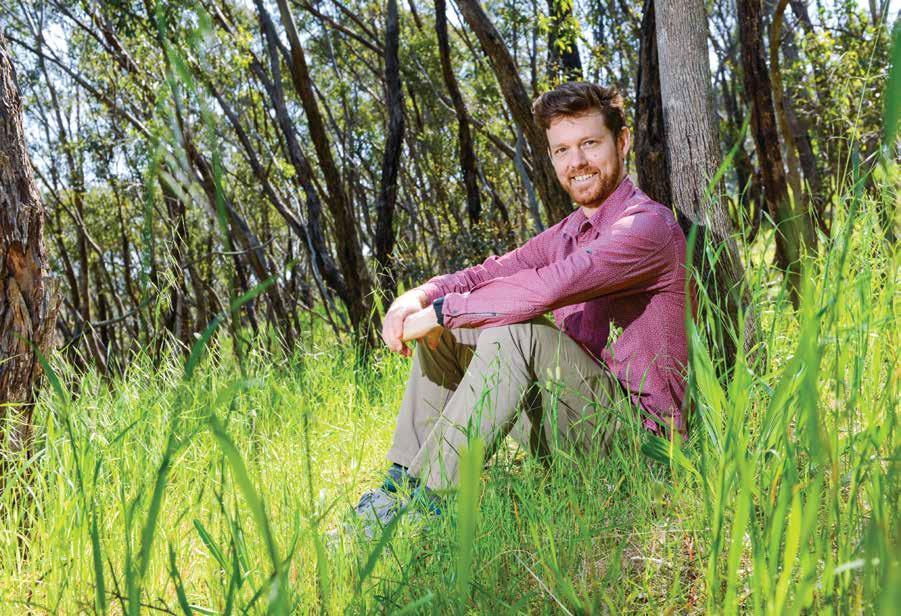
“The closer to the ground we investigated, the more similar the airborne microbial population was to the soil, so small children playing closer to ground level are getting exposure to greater microbial diversity than adults.”
They also compared the results with microbes in Belair National Park, which has a greater diversity of plant species compared to urban sports fields – discovering that this complexity of vegetation significantly increased the diversity of microbiomes people are exposed to.
“Therefore, we should not only be thinking about regularly visiting biodiverse green spaces, but also participating in activities that get us closer to the ground and its rich microbial diversity that benefits our immune system,” says Associate Professor Breed. “And if we shape the microbial communities on sports fields by planting a range of species, we will have an even greater opportunity to improve our health and wellbeing.”
Throughout the study, Associate Professor Breed and his team worked with a range of councils and government agencies including SA Health, Green Adelaide landscape board, and the Department for Environment and Water. Sharing the study’s results has influenced the Healthy Parks Healthy People SA framework developed by the SA Government.
“The framework is connected with a larger ambition for Adelaide to increase its biodiversity, recreation and interaction with nature, to become the world’s second National Park City after Greater London, where almost fifty percent of green cover makes this metropolis one of the world’s most vegetated cities,” says Associate Professor Breed.
“In understanding the benefits of exposure to microbes in soil and the role of plant diversity in our health and wellbeing, the value we can place on green spaces becomes much, much greater.”
“It’s just one way that we can improve our health and the environment, plus save money by reducing public health spending.”
Transform lives and improve our community by supporting early career researchers to explore new fields of research.
Associate Professor Martin Breed
Flinders.edu.au/donate 9
DONORS
Larry Abel
Lateef Adeleye
Veronica Aldrete
John Algar
Bonnie Allmond
Michael Alpers
Tom Altree
Gunther Andersson
Vida Angel
Karen Ashford
Sharon Ayris
Sukhvinder Badwal
Chris Baggoley AO
Peter Bailey
Barbara Baird AM
Glenn Barkley
Amanda Barlow
Margaret & Bryan
Barlow
Greg Barritt
Simon Battersby
Neil Batty
Jo Baulderstone
Merridy Baylis
Melissa Birks
John Bishop AO
Trevor Blackburn
Roslyn Blandy
Neal Blewett
AC
Jane & Edward Booth
Martin Borg
Chris Bowman
Margaret Bragg
Ionie & Max Brennan AO
Jo Briggs
Freddie Brincat OAM
Patrick Brislan
Annelie Brixius
Gaynor Brook
Mark Brooke-Smith
Rosemary Brooks OAM
Barbara & Cyril Brown
Trevor Bruhn
Bob Brummitt
Bruce Buchan
David Bunce
Lawrence Burk
Margaret Butler
Gabriela & Shayne
Callaghan
Bronwyn & Phillip Carson
Joyce Carter
Robert Castelow
Claire Catt
Daryl Catt
Leanne Cavenett
John Chalmers AC
Allan Chan
Wah Chow
Francesco Cirrincione
John Clancy
Louise Clements
Michele Cochrane
Penelope Cockington
Nayia Cominos
Celia Cookson
Gabriel Cooper
Gina Copeman
Suzanne Corcoran
Milly & Andrew Costi
Rhana Crago
David Craig
Jonathan Craig
George Cresswell
Maria-Teresa Cricelli
Jennifer Cuthbertson
Eleonora Dal Grande
Chantal Davenport
Kevin Davis AM FAIBF
Jenny & John Dawes
Robert Dawson
David Day
Rosanne DeBats
Bozo Djuric
Marie Dreux
Emily Drewniak
Walter Duncan
Vivienne Dunstone
Alan Easton
Danny Eckert
Anne Edwards AO
Theo Ellenbroek
Pipina Elles
Rebecca Esteve
Meredith Fantham
Helen Fehlberg
Richard Fejo
Jayne Flaherty
Graham Fraenkel
Chris Franco
Rod Fraser
Anna & George Freney
Gareth Furber
Florence Furechi
Annie Gan
Ann Gardiner
Douglas Gautier AM
Steve Geddes
Jane General
Aida Ghulam Rasool
Terry Giesecke
Robyn & John Glenn
Mark Goldsmith
Margaret Goode
Olga Gostin
Sarah Gray
Trevor Gray
Solveig Grenfell
Annelise Grey
Sarah Griffen
Lee-Anne Hall
Keith Hancock AO &
Susan Richardson AM
Leonie Hardcastle & Andrew Parkin
Amanda Harkness
Maria Harran
Jennifer Harris
Michelle Harris
Isobel & Michael Harry
Melissa Heath
Helen Heithersay
Roger Henderson
Tanner Henderson
Katya Henry
Susie Herzberg
Dianne Hill
David Hilliard OAM
Maxwell Hodge ^
Bree Hodgson
Joe Hortovanyi
Kate Hudson
Melissa & Brett
Hughes
Jennifer Humphrey
Kirby Hunnable
Alastair CS Hunter OAM
Peter Hussin
Georgie Ilich
Kylie Jarrett
Scott Johnston
Erica Jolly CUniv
David Kaczmarek
Matthew Karakoulakis
Mark Keam
Rebecca Keough
Aravind Kesavan
Sylvia Kimpton
Elizabeth Knight
Bianca Koch
Michael Kooymans
Paul Kruger
Barbara Kupke
Jennifer Kuyper
Tony Kyriacou
Angela Lacey
Leon Lack
Diana Laidlaw AM
Melinda Lee
Peter Leverenz
Janis Lindbergs
Matt Lindner
Nick Llewellyn-Jones
Rianna Lopez
Emma Mackenzie
Haydon Manning
Christine Marsden
Alfred Martin
Annette Masters
Roger Masters
Paul Mazourek
Sheila McCarthy
Bill McKee
Deanna McKeown
Frank McKone
Warwick Mitchell
Peter Monteath
Betty Moore
Anne Morris
Russell Mountford
Wendy Murchland
Andrea Murray
Janet Murray
Michael Nance
Ada Nataren
Elizabeth Naumczyk
Beth Neate
Patricia Nesbitt
Van Lam Nguyen
Jennifer Nicholls
Maureen Nimon AACS
Linda Notley
Maureen & Richard Oborn
Ann-Maree O’Connor & the late Peter E Bailie
B Oliver
Suzanne Parker
Sarah Parrish
Tahlia Parrish
Judy Parsons
Robert Paterson
Claire Paull
Helen Pearce
Colleen Penny
Liz Perry AM
Helen Petros
Casselia Phillips
Melinda Pike
Wee Ching Pok
Greg Powell
Trudy Priest
Kim Pryor
Nadia Pusz
Hamish Ramsay
Malcolm Ray
Julie Rayner
Chris Reid
Alistair Rendell
Robert Rice
Linda Richards
Charles Frederick
Richardson
Suzanne & Laura
Ritchie
Joan Robins
Bev Rogers
John Rogers
Greg Ross
Dorothy Rowell
Stephanie Rowland
Jane Russell
Thank you to our many donors who wish to remain anonymous and to those who have made a bequest in their Will.
10 FLINDERS UNIVERSITY / Impact of Giving 2024
Richard Ryan AO
Bryce Saint OAM
Linnett Sánchez & David Turner
Frank Scali
Amanda Schiller ^
Helen Schinckel
Arthur Schmidt
Martin Scurrah
Lea Thin Seow
Geoffrey Shacklock
Margaret Shearwood
Sarsha Sherriff
PK Singhai
Cynthia Smith
Lesley Smith
Alison Smyth
Helen Spencer
Sam Sra
Helen Stanley
John Warne
David Wattchow AM CUniv
Garry Weatherill
Michael Weightman
Mark Weng
Rachael West
Alison Whish
Irena & Gerry White
Heather Whitford
Emma Widdison-Duke
Heather Williams
Melinda Williams
Brenda Wilson AM
John Wilson
Kit May Wong
Margaret Woodcock
Ronald Wright
Jeanne Young
Lihua Yu
Bruno Yvanovich
Embellish Beauty
Eyre Care
Fay Fuller Foundation
Harrison Productions
Hunter New England Local
Health District
Integrated Heritage Services
Jordem Pty Ltd
Julia Farr MS Mcleod
Benevolent Fund
Kangaroo Island Wildlife
Park
Kazan McClain Partners Foundation
KH and KH Enterprises
Pty Ltd
Laurance Family Trust
Leahurst Nurses’ Foundation
Little Heroes Foundation
Travelling Tale Productions Pty Ltd
TREE Fund
Turner Freeman Lawyers
Wallis Heritage Consulting
Wattle Range Council
WAX Design
BEQUESTS
The estates of the late
Mavis Haydon
Gordon & Barbara Heaslip
Douglas Henderson
AJ & IM Naylon
GIFTS-IN-KIND
Leigh Burrows
Norman Feather AM ^
Linnett Sánchez & David Turner
In memory of Ali Lehman
Don DeBats
In memory of
James Moore
Cheryl & Carey Fear
Fay & Barry Williams
In memory of James Rennie
Suzette Harman
In memory of Craig Ruddy
Catherine Anselmi
Mike Bowen
Matua & Makenzie Jansen
Roberto Meza Mont
In memory of Dr Lesley Shorne
Catherine Antonio
Susan Allan
Margaret Allen
Chris Antonio
Maureen Gallagher
... to our many donors who partnered with us in 2023 * to change lives.
Helen Stein
Colin Stirling
Kym Stockman
Susan & Martin Straub
Lyn & John Swincer
Katherine Taalman
Caroline Tait
Acram Taji AM
Elaine Tan
Rob Tanner
Joan Thomas
Beth Thompson
Jacqui Thorburn
Marika Tiggemann
Mark Tozer
Anna Treloar
Alan Tucker
Lucia Vaiciulevicius ^
Joe Van Dalen
Rhonda Vanreenen
Pepe Velasquez
Gregory Venn
Leigh Von Bertouch
Maria Vouis
Lucas Wagner
Margaret Wall
*The
ORGANISATIONS
Adelaide Theatre & More Social Club Inc
Andrew Thyne Reid Foundation
Asbestos Victims Association SA Inc
Atlantic White Shark
Conservancy
Australian Academy of Science
Australian Geographic Society
Australian Rotary Health
Australian Vision Research
Big Duck Tours
Big Wave Productions Ltd
BirdLife Australia
Calvert Technologies
Carroll & O’Dea Lawyers
Comber Consultants
Community Bridging Services (CBS) Inc
Cybec Foundation
Ecological Society of Australia
Mediserve Nursing Agency
Mile End Office Furniture
Monterey Bay Aquarium
Foundation
Nature Conservation
Society of South Australia
Neale Draper & Associates
Nepean Blue Mountains
Local Health District
Perpetual Trustee
Australia Ltd
Radiology SA
Rockstar Management
Rodney Fox Shark
Expeditions
Rotary Club of Barossa
Valley Foundation Inc
Save Granite Island
Penguins
Sophia Women’s Centre
St Theodore’s Anglican Church
The Last Post
The National Foundation for Australia-China Relations
The ResMed Foundation
The Weise Foundation Inc
GIFTS-IN-MEMORIAM
In memory of Phillip Beddall
Cathi Tucker
In memory of Dr Terry Clark
Kerry Clark SC
In memory of Richard Conyers
Jackie & Ron Conyers
In memory of Maria Denison (née Mazzaro)
Silvana Mazzaro
In memory of Ernest Eric Edwards
George Edwards
In memory of Peter R Fiora
Maria Del Col
In memory of Leon Harder
Hall & Hill Families
In memory of Kaye Huf
Alisa Williams
In memory of Dean Jaensch
Helen McSkimming
Patrick Morgan
Janita Hill
Sandra Kanck
Karen Middleton
Geoffrey Sauer
Adrienne Williams
In memory of Bob Such
Charles Such
In memory of Maureen & George Swafford
Glenn Swafford
In memory of Lucia
Vaiciulevicius
Therese Martin
Cheryl Melquist-Kahl
Judith Richter
In memory of Rex Elliot Wegener
Catherine Wegener
In memory of Lindon Wing
Jennifer Abbey AM
Katrina Ellis
John Finlay-Jones
In memory of Stafford Wulff
Brian Liston
David Scarman
Neil Trout
Donor Honour Roll recognises those who donated to Flinders University between 1 January and 31 December 2023. ^Donor has since passed away.
11
Providing a way forward
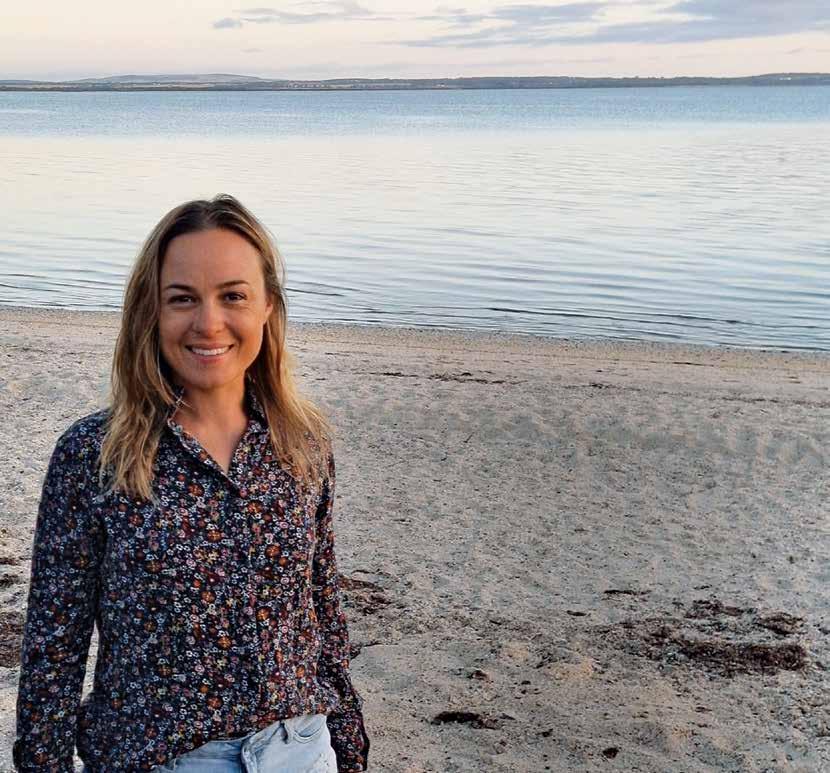
Reaching the first year of her PhD in Earth Sciences (Coastal) at Flinders University has taken 34‑year‑old Enya Chitty an incredible amount of grit and determination, as well as the financial support of two donor‑funded scholarships.
Pursuing university studies as a single mother living on Kangaroo Island has proved especially difficult for Enya, but she has prevailed and triumphed with help from the Jessie Cooper Scholarship for Women and the Weise Foundation Scholarship.
JESSIE COOPER SCHOLARSHIP FOR WOMEN WEISE FOUNDATION SCHOLARSHIP
These donor-funded scholarships enabled Enya to cover travel expenses necessary to commute regularly from Kangaroo Island to Flinders’ Bedford Park campus to achieve her Bachelor of Science (Honours) Enhanced Program for High Achievers (Coasts and Oceans).
It represents a remarkable turnaround for Enya, who says she lacked direction as a teen and subsequently dropped out of high school after being told that her performance and decisions, at the age of 16, would make or break her success in life.
SUPPORTING EDUCATION
Pictured: Enya Chitty
12 FLINDERS UNIVERSITY / Impact of Giving 2024
When she finally did commence tertiary studies in 2020 as a mature age student, her resolve was severely tested.
“In my first year of study, while travelling back and forth to Flinders, I was also home schooling my two kids while building an off-grid house. My family lived in a shed without power and running water, and I studied using solar panels to run the laptop. Then in my third year of study I was diagnosed with ADHD, after my kids were diagnosed,” she explains.
“Finding the money, time and energy to travel to campus has been overwhelming, plus finding friends and family to accommodate me in Adelaide so regularly was an added pressure.”
Since 1994 the Jessie Cooper Scholarship for Women has changed the lives of many women who commenced university studies later in life – assisting them to finish their degree and work towards their career goals.
Marking 100 years of South Australian women gaining the vote, the scholarship was named in honour of Jessie Mary Cooper (1914–93), the first female Member of the Legislative Council in South Australia and a founding Council Member of Flinders University.
The scholarship was created by the Flinders Alumni Association to address the growing concern of retention rates of women in their final year of study, and to support students like Enya to continue their studies.
Flinders University Law and Commerce graduate Jack Weise is also keen to provide support for students to continue their studies. In 2022 he created the Weise Foundation Scholarship to help students facing financial challenges, especially refugees, single parents, and Aboriginal and Torres Strait Islander students.
Jack, a Senior Legal Counsel who now works in Singapore, says he hopes his contribution can provide the same type of study opportunities that have propelled his career to international success.
Such support has proved critical for Enya, whose mettle continued to be tested during her Honours studies in 2023. She spent more than a month caring for her family while they had COVID, moved house unexpectedly, suffered from pneumonia after contracting Influenza B, and spent six weeks hobbling about in a moon boot after a surfing accident.
“At times life is chaotic and bizarre, but there is always a way forward,” says Enya.
“These scholarships provided a way forward. They were a big help to me, and I am grateful to the donors.”
Recognition for her efforts has also provided momentum. In 2023 Enya won the Soroptimist International Southern Districts of Adelaide Prize for High Achieving Women, along with the John Lewis Prize for Excellence in Undergraduate Geography from the Royal Geographical Society of South Australia, for each year of her undergraduate degree.
Enya is now excited to commence her PhD at Flinders researching seagrass restoration. Funded by SA Water and led by Flinders University’s Associate Professor Graziela Miot da Silva, this project is an important aspect of nature-based solutions for climate change adaptation in South Australia’s coastal waters, which could have global implications.
“I chose to study coastal science as I feel strongly connected to the coast.”
“Humanity is deeply reliant on coastal systems. Half of the world’s cities are sited on estuaries, two-thirds of all people live within 60 kilometres of the coast, and 40 percent of the world’s coastlines are degraded. As such, nearshore coastal environments have a critical role to play in climate change mitigation and adaptation, presenting some of the greatest challenges, and opportunities, now and into the future.
“I hope that contributing to research in this field will help not only the environment and economy, but also marginalised coastal communities. I want to create practical applications that will enhance the future of these communities.”
Thirty years since the Jessie Cooper Scholarship for Women was created, many women continue to face family pressures and obstacles to completing their degree.
Help women reach their potential, donate online today:
S can to donate
13
DRIVEN BY a passion for psychology
BEQUEST TO SUPPORT PSYCHOLOGY PROGRAM
A generous bequest is set to extend opportunities for students and researchers in Flinders University’s highly regarded Psychology program.
Having studied and initially worked as an organisational psychologist, Emeritus Professor Phyllis Tharenou says psychology has always been her passion.
The former Vice-President and Executive Dean of the College of Business, Government and Law says, “Discovering organisational psychology changed my work and my life. I had been a school teacher in science and maths but had always been attracted to aspects of organisational psychology.”
“Qualifying in psychology enabled me to change jobs and do work I loved.”
After gaining her PhD in Organisational Psychology, Emeritus Professor Tharenou assessed applicants for entry into the RAAF and undertook high-level consulting projects for corporate companies, before forging an academic career.
Driven by her passion for psychology, Emeritus Professor Tharenou has chosen to leave a generous donation in her Will, through the sale of her estate, to the Psychology teaching and research program at Flinders University.
“I know that Colleges within Australian universities are tight for money and these days don’t control their own budgets, so I want the Psychology program to decide where and when to spend the bequest, as the academics are best placed to recognise the need,” says Emeritus Professor Tharenou.
“I hope the impact of this support will be that psychology students benefit from new education and research opportunities.” Emeritus Professor Tharenou
Professor Lydia Woodyatt, head of the Psychology teaching program at Flinders, says the financial support is much needed and that Emeritus Professor Tharenou’s bequest will make a huge impact on the program and its students.
“With an investment like this, Flinders can continue to produce world-leading research and nation-leading education in Psychology and Psychological Science,” says Professor Woodyatt, noting that Flinders is ranked number one in Australia for Undergraduate Teaching Quality in Psychology by the 2024 Good Universities Guide
“These funds could help new discoveries in areas such as workplace and community mental health and wellbeing, learning in neurotypical and neurodivergent people, and how humans are shaped by their interactions with technology and AI.
“It will enable us to enhance our students’ learning experiences and research impact. For example, creating opportunities for students to travel for research collaboration and conferences or take on remote placement opportunities, scholarships to enhance equity and access, or start-up funds to support early career researchers or collaborative projects with industry.”
Emeritus Professor Tharenou says she experienced many of these opportunities during her psychology studies and her long and successful academic career – from Queensland University of Technology
IMPACT THROUGH BEQUESTS
14 FLINDERS UNIVERSITY / Impact of Giving 2024
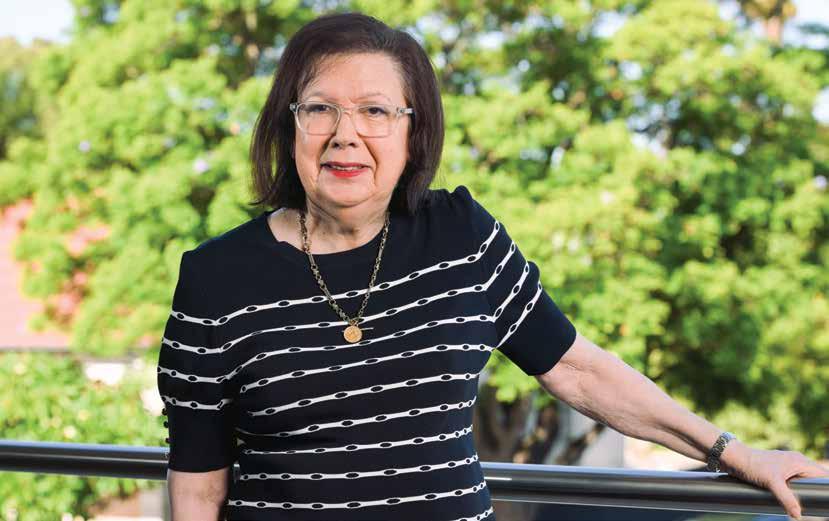
and University of Queensland, where she attained associate professor status, to 11 years at Flinders University that culminated as a College Vice-President and Executive Dean.
Beginning her time at Flinders University in 2010 in the role of Executive Dean of the Faculty of Social and Behavioural Sciences, Emeritus Professor Tharenou then concurrently held the role of interim Dean of the Flinders Business School from 2014. In July 2017 she was elevated to Vice-President and Executive Dean, College of Business Government and Law, until she retired in January 2021.
Reflecting on her academic career success, Emeritus Professor Tharenou says:
“I learned a lot about leading academic staff and found that I cared greatly about students and
ensuring their growth and success.” Emeritus Professor Tharenou
As her professional roles evolved, Emeritus Professor Tharenou says she never lost her passion for psychology, especially organisational psychology – though admits her executive roles were equally rewarding and challenging.
In addition to being a successful academic and administrator, Emeritus Professor Tharenou is
recognised as a leader in research and was invited to chair the ARC’s College of Social, Behavioural and Economic Sciences. She is currently listed in the top two percent of researchers worldwide in her field of business and management.
On leaving her bequest, Emeritus Professor Tharenou says, “Flinders has been very good to me, so this bequest combines my love of psychology and my gratitude to the University for supporting me during my career.”
Leave a lasting legacy – include a bequest in your Will to support students or research at Flinders University.
Contact Mark Goldsmith
0421 818 130
mark.goldsmith@flinders.edu.au
15
Emeritus Professor Phyllis Tharenou
Women TAKING ACTION for reconciliation
SOPHIA INDIGENOUS SCHOLARSHIP
One of Flinders University’s longest running, donor funded scholarships is driven by a community group’s call for reconciliation.
The Sophia Women’s Centre connects women through a shared focus of embracing diverse spiritual traditions and working towards an equitable society. In their pursuit of equity, members of the Centre, and close friends, have taken action for reconciliation through education. In November 1996, Maree Spence walked alongside Ngarrindjeri women protesting the building of the Hindmarsh Island bridge. As a physiotherapist, she provided the walkers with the practical support of massages. Along the way stories were shared on the cultural importance of Hindmarsh Island, and strong bonds were formed between the women.
Inspired, Maree initiated ‘Around the Kitchen Table’, a sharing circle for Ngarrindjeri Aunties to share their traditional culture. Moved by her learnings in the circle, Sophia Women's Centre member Jenny Wightman created the Sophia Reconciliation Group.
Jenny says, “I learnt about the barriers these women faced in accessing health and education, and realised that we need to show more care for Indigenous people and their culture.”
“We have so much to learn from Aboriginal people and so much to understand about their struggles to fit in with our imposed culture. They have wisdoms that our culture hasn’t even glimpsed.” Jenny Wightman
In 1999 the Sophia Reconciliation Group committed to driving change in a real way by establishing the Sophia Indigenous Scholarship at Flinders University. The annual scholarship supports an Aboriginal or Torres Strait Islander student to access resources needed to achieve their degree.
Each year, members contribute what they can to the scholarship. Jenny says, “It is a way for ordinary women to provide ongoing support for Indigenous students.”
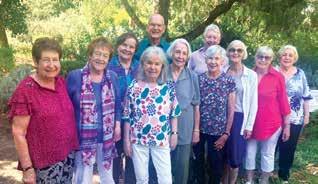
Across 25 years, the scholarship has supported 25 Aboriginal and Torres Strait Islander students and has recently grown from $500 per year to $5,000 – to create a transformative impact for recipients. Nursing student Isis Kartinyeri received the scholarship in 2023 and says the support helped her to buy textbooks and equipment needed for her degree.
“I want to express how thankful I am for the support and how much I appreciate it. It has pushed me to keep aiming to achieve this degree at my highest ability.” Isis Kartinyeri
With such positive feedback from the recipients, the Sophia Reconciliation Group know their efforts are working to close the gap, and they encourage others to also act in a spirit of reconciliation.
Jenny says, “I am hopeful that the wider Australian society is on the brink of recognising the wisdom of Indigenous peoples.”
Pictured above, Sophia Reconciliation Group L–R: Maureen O’Connell, Maggie Nicholls, Rosanne DeBats, Fiona Johnston, Peter Lee, Jenny Wightman, Libby Cooper, Trish Fairley, Annie Gleeson, Pauline Small, Tess Gibson. Absent: Judith Condon, Ros Gill, Annette & Geoff Jarrett, Erica Jolly CUniv, Celia Karpfen, Margaret Kennedy, Elaine Lee, Cecily Orenstein, Louise Portway, Maryanne Sanders.
COMMUNITY GIVING 16 FLINDERS UNIVERSITY / Impact of Giving 2024
Achieving a dream
QUEENIE GIBBINS SCHOLARSHIP IN SCIENCE (BIOTECHNOLOGY)
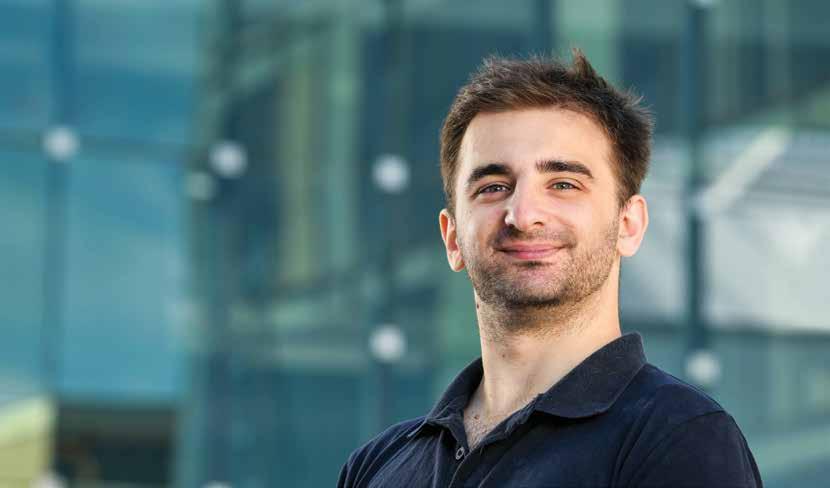 Robert Constantine
Robert Constantine
A dream and donor support has changed the trajectory for a science graduate from generational poverty.
Growing up on a farm near Curramulka, a small country town on the Yorke Peninsula of just 304 people, options and opportunities were bleak for Robert Constantine.
He says, “I made a joke when I was younger about becoming a scientist because I thought it was ridiculous for a poor country kid to do so, but no-one laughed so I just kinda went with it.”
Despite dropping out of school at 16, his ‘joke’ about becoming a scientist quietly grew into a dream for Robert, who later applied for a Bachelor of Science at Flinders University as a mature age student.
“At Flinders I really enjoyed learning about how cutting-edge science is translated into everyday living. From medical biotechnology to agricultural enhancements, biological sciences have a far greater impact in society than I’d imagined,” says Robert. But Robert soon discovered he was one step behind others in his learning, and he wondered if he could achieve his dream of becoming a scientist.
“Coming from a poor area I had to catch up on a lot of things I didn’t learn at school. I really struggled to stay motivated.”
With determination Robert reached his final honours year, specialising in biotechnology, and was grateful to receive the Queenie Gibbins Scholarship in Science (Biotechnology) for students in financial need.
In 1997 philanthropist Queenie Gibbins (1909–2006) created the scholarship in memory of her brother who fought and died in World War II, noting that he didn’t have the opportunity to achieve a university education.
Queenie had a particular interest in assisting students in the field of biotechnology – she wanted to see students with an innovative focus succeed.
Robert says the $2,000 scholarship has had the intended impact.
“I wouldn’t be where I am today without the help of this scholarship.”
“It really reduced my financial stress. I used it to pay rent and bills, alongside being able to access technology to help with my studies.”
Having just graduated, Robert is now looking forward to full-time, stable employment – which he says, “I’d be the first in multiple generations to achieve.
“I’ve really enjoyed the journey of studying at Flinders and now I’m keen to contribute to the scientific community in a meaningful way.”
SUPPORTING EDUCATION 17
ENCOURAGING EXCELLENCE in creative writing
DR RUTH STARKE CREATIVE WRITING PRIZE
A brilliant writer, critic and teacher, Dr Ruth Starke inspired generations of readers and students.
The award-winning author was also known for championing excellence in writing – a legacy which now continues through the Dr Ruth Starke Creative Writing Prize at Flinders University.
Dr Starke died in 2022, aged 76, and is remembered and respected as a staunch advocate for South Australian literature, with an unbridled passion for writing, reading, language and literature.
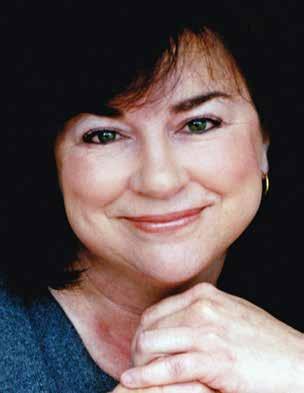
Acclaimed titles among her 20 fiction books for children and young adults include the award-winning NIPS XI, which was named Honour Book (Younger Readers) in the 2001 CBC Awards, graphic children’s novel An Anzac Tale, young adult novella Stalker, children’s historical fiction Orphans of the Queen, and the Captain Congo series of graphic novels.
Gaining a Bachelor of Arts with First Class Honours at Flinders in 1996, Dr Starke later completed her PhD in English and Creative Writing in 2001, before teaching in the Creative Writing program at the University.
Honouring their mother’s passion for excellence in creative writing, Miranda and Petra Starke have donated $12,500 to establish the Dr Ruth Starke Creative Writing Prize. The $1,000 annual prize will be awarded to the student who achieves the highest mark for a creative work produced for a Creative Writing topic.
Emeritus Professor of Creative Writing and English, and the first Dean of Graduate Research at the University, Jeri Kroll launched Flinders’ Creative Writing program in the 1990s. She says this prize is a wonderful opportunity to encourage writing students to set their sights high.
“Ruth enjoyed not only challenging her students, but also herself. As a versatile writer and an inspiring teacher, she had a gift for encouraging students to be the best they could be.” Emeritus Professor Jeri Kroll
The creative writing prize will encourage aspiring writers to reach further in their pursuit of excellence in writing, and help boost their opportunities as they launch their career.
We invite you to honour the life and work of Dr Ruth Starke by donating to the Dr Ruth Starke Creative Writing Prize today.
Flinders.edu.au/Giving‑RuthStarke
GIVING IN MEMORY
S can to donate 18
Dr Ruth Starke
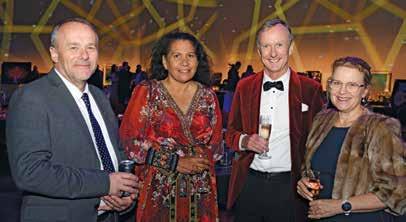
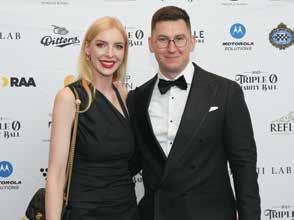
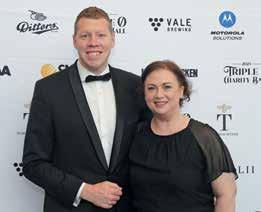
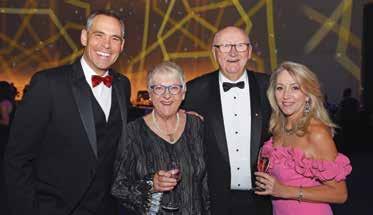

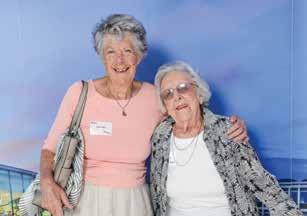
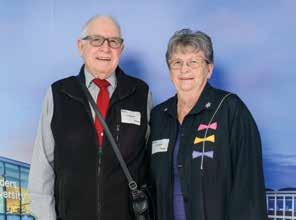
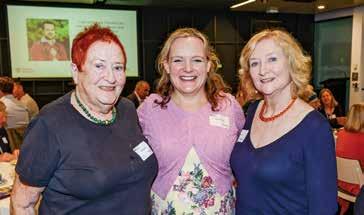
DONOR EVENT GALLERY
IMPACT OF GIVING DONOR AFTERNOON TEA
19
TRIPLE 0 CHARITY BALL
e would love to hear from you! Donate to our Annual Appeals Support a Research Study Attend our Events Create a Scholarship Help us Fundraise Sign up for Staff Workplace Giving support education & research Give in Memory or Celebration Leave a Bequest in your Will Give a Cultural Gift Advancement, Flinders University +61 8 8201 3721 | giving@flinders.edu.au Flinders.edu.au/giving











 Robert Constantine
Robert Constantine








